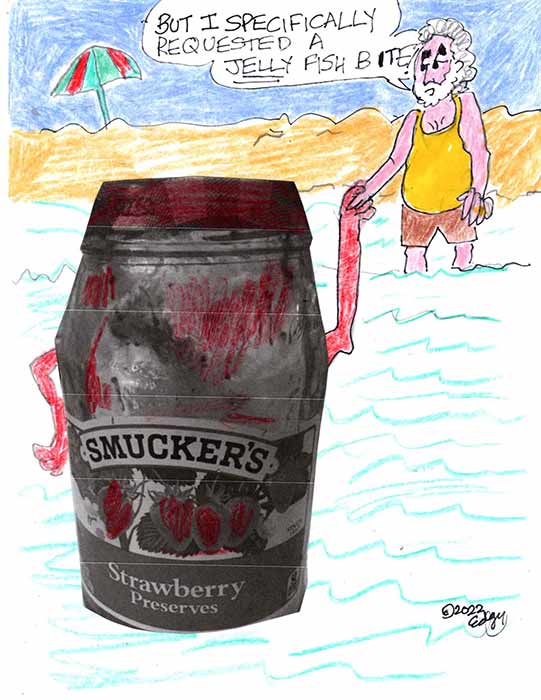What You Need to Know About the Immortal Jellyfish
“Death, where is thy sting?” [Ouch! Never mind!]
By Ed Goldman
It isn’t often that I get to announce scientific breakthroughs in this column. That all changes today: Scientists, I’m happy to report, have succeeded in mapping the genome of a creature admiringly referred to as an “immortal jellyfish.”
I’m sure that purists will object to how this finding was prioritized—i.e., why wasn’t the immortal peanut-butter fish mapped first?
Something’s been left a jar
I also wondered why the aspic-jelly fish didn’t factor into the announcement, but let’s face it: When you say the word “aspic” aloud, and hope against hope it’s not a compound noun, do you really want additional data?
The “immortal” jellyfish comes by its hype honestly, however. It’s thought to “cheat death by rebirthing itself,” according to a late-summer report in The Wall Street Journal (whose motto should be, “If you skip our right-wing editorials, we’re actually a lot more interesting than the New York Times”).
“Dubbed the immortal jellyfish,” write reporters Ginger Adam Otis and Alyssa Lukpat, “the tiny sea creature can turn its biological clock backward and revert to a clump of juvenile cells—even after reproducing sexually.”
By a certain age, I think we’ve all had dates that end up that way.
The intrepid reporters go on to explain that “Once back in its juvenile state, the jellyfish can also reproduce asexually by cloning polyps of itself—giving it two ways to propagate its genetic material.”
Now, I’ll admit that for me, combining the words “juvenile” with “jellyfish” is a profile in courage. As we all know, “juvenile” should exist as an adjective only to modify “delinquent,” “behavior” and, much-too-closer to home, “humor.”
As for “jellyfish,” there are an unlimited number of adjectives to quantify it. That none of them occurs to me at the moment shouldn’t be taken as the final word on the subject. I’m slightly drunk.
Kidding—but you’ll have to admit that’s a pretty good excuse for getting one out of verbal scrapes. It’s much more credible than riposting, when you’ve been horribly insulted in front of a crowd, “Man, I could say something—but I won’t.” You think that’ll come off as indicating you have this explosive arsenal of devastating witticisms you simply won’t deploy, out of a sense of decorum or tact—while everyone knows the brilliant reply cascading around your hapless cerebrum is, “Oh yeah?!”
Now, a few quick thoughts before we get too excited about the mapping of the immortal jellyfish’s genome—by the way, you do know this word refers to the chromosomes or genes or capri pants of a cell or organism, right? Because if not, were just wasting each other’s time—and before we expand on that and start to believe the findings will one day lead to our own immortality, I need to offer this sane-and-sensible remark from Maria Pascual Turner, one of the researchers at the University of Oviedo in Spain.
“It’s a mistake to think we will have immortality like this jellyfish,” she told the WSJ reporters, “because we are not jellyfish.” I found this very useful in that it prevented me from diving underwater and stinging frolicking beachgoers just because, you know, I could.
Also weighing in was Professor Monty Graham, who teaches integrative biology and is director of the Florida Institute of Oceanography, so presumably knows what the hell he’s talking about (which will bar him for life from getting his own column). He said, “The fate of everything in the ocean generally is to be eaten at some point.”
A remark like that could end my burgeoning obsession with paddle-boarding. I mean, it’s not like I’m immortal.
Ed Goldman's column appears almost every Monday, Wednesday and Friday. A former daily columnist for the Sacramento Business Journal, as well as monthly columnist for Sacramento Magazine and Comstock’s Business Magazine, he’s the author of five books, two plays and one musical (so far).














